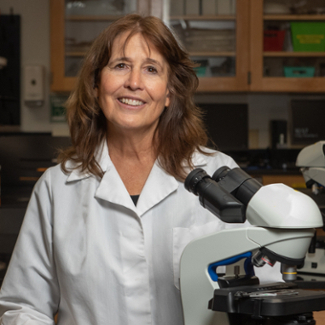As we observe the “International Day of Women and Girls in Science” on Feb. 11, we would like you to meet Professor Jill Caporale, who teaches Biology and Environmental Science at NOVA’s Annandale Campus. She has taken the question of how to get students engaged in learning science and turned it on its head. "My feeling is to get students into the field." Caporale likes to swap out the science lab for nature's lab.


“It's humbling that so many of my students have gone on to become environmental scientists or marine biologists,” she said. “Even if they haven't gone on in the field, they've gone on to care about the environment and make an impact.”
Jill is grateful for NOVA's support over the last 30 years. "While teaching is my passion, I have also enjoyed mentoring fellow faculty and students and supporting the effective governance of NOVA." During those 30 years, she has created and led nine environmental study abroad courses for NOVA—courses held in Costa Rica, Honduras, Fiji, Cuba and Brazil—that focused on bridging cultures through a shared concern for the environment.
Her face lights up when she talks about these trips with her students. Instead of just talking about a coral reef, the students jump in the water and study them directly. "It's the kind of classroom that helps students appreciate the intricacies of our complex biological world," she said.
“In Fiji, while snorkeling in the waters of the South Pacific, we studied the coral reefs not only during the day but also at night. After the sun goes down, different organisms come out. They truly are illuminating with their bioluminescence. It is an amazing sight to see.
“When you look down in the water, you see the light emanating like tiny stars. Then look up and you are overwhelmed by the beauty of the night sky and the limitless stars above. It's a moment to relish.”
One of the biggest payoffs for Jill comes in the priceless expressions on her students' faces. Before taking their big plunge, students learn how to snorkel in a pool. Then it's off to the reef. “My favorite thing is I jump into the water and wait for the reaction of my students seeing this new beautiful underwater world and a coral reef for the very first time. They are so ecstatic! I love that!"
Jill tries to get her students to understand, connect and become invested in the experience and beauty that's surrounding them. "It's important to find love between what you're studying and what's in the real world. To do this, I take the students first to see these gorgeous reefs. This is what they're supposed to look like, and then, I take them to what's happening on most reefs, and they are heartbroken, too."
Unfortunately, humans are having a devastating effect on the world’s coral reefs. Between global warming and pollution, the reefs are dying. “For over 40 years, my husband and I have been snorkeling and diving, and we're seeing reefs degrade all around the world. It impacts you very differently when you hear that we lose 12% of our reefs every year after actually seeing the devastation. And it makes you think, ‘This is what we are doing to our world!’"
How do you encourage future STEM leaders, especially young women, to enter the field?
It's about getting students out in the field, which excites all their senses and curiosities. These trips also help promote independence, confidence and a greater worldview. Most students that sign up for study abroad trips are women.
How do you feel about being recognized for the CAORC award, and what does it mean to you? Share your experience in India.
I was just thrilled. India has always been on my bucket list. I've always wanted to learn about it. So this past January (2023), I became the student!
With NOVA's support, I was selected by the Council of American Overseas Research Centers (CAORC) as one of 14 professors from across the U.S. to participate in a two-week program, "Exploring Urban Sustainability Through India's Cities." We traveled to Northern India, stopping in New Delhi, Jaipur, Lucknow and Agra.
This two-week program was geared toward investigating the problem of creating sustainable cities where overcrowding, climate change, air pollution, and water issues are having a dire impact. I went there with the thought that the project would be more of an environmental sustainability study. But other issues involving the people, their circumstances and their kindness become more of a focal point.
Tell us how working with students has been impactful for you.
I remember standing at baggage claim at National Airport with the students. We were returning from a trip to Cuba, and you could see that one of the students was completely covered in mosquito bites. Still, she was smiling and unfazed because of the educational and cultural experience she just went through. That look of joy and satisfaction on our students is my best reward.
What kind of an impact do you want to have through your work?
NOVA provides a forum to engage and educate a very diverse and multicultural student body. My hope is that NOVA's Biology and Environmental Science courses continue to provide critical science understanding and context. So, our students appreciate the role of science and the environment as they pursue their goals.
We need to first expose our students to the wonder and beauty of the world. From there, through science, they can begin to understand the planet, life and the forces from which biology functions. This understanding and exposure can bring about a deeper love of learning. And as Jacque Cousteau would say, "People protect what they love."
As I reflect on my tenure at NOVA, I can't help being very proud of our students and how we have provided them with life-long impacts and opportunities. I can only hope they feel the same.